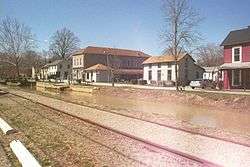Metamora, Indiana
| Metamora, Indiana | |
|---|---|
| Census-designated place | |
|
Metamora, with railroad and canal in the foreground | |
 Location of Metamora in Franklin County, Indiana. | |
 Metamora Location of Metamora in Franklin County, Indiana. | |
| Coordinates: 39°26′59″N 85°08′22″W / 39.44972°N 85.13944°WCoordinates: 39°26′59″N 85°08′22″W / 39.44972°N 85.13944°W | |
| Country | United States |
| State | Indiana |
| County | Franklin |
| Township | Metamora |
| Area | |
| • Total | 0.3 sq mi (0.9 km2) |
| • Land | 0.3 sq mi (0.9 km2) |
| • Water | 0 sq mi (0 km2) |
| Elevation | 718 ft (219 m) |
| Population (2010)[1] | |
| • Total | 188 |
| ZIP code | 47030 |
| FIPS code | 18-48563[2] |
| GNIS feature ID | 439045[3] |
Metamora is an unincorporated town and census-designated place in Metamora Township, Franklin County, Indiana. The town was once a stop along the Whitewater Canal and is now primarily dependent on tourism. As of the 2010 census, it had a population of 188.[1]

Geography
Metamora is located at 39°26′59″N 85°08′22″W / 39.44972°N 85.13944°W, in the valley of the Whitewater River in southeastern Indiana. It is situated on U.S. Route 52, 49 miles (79 km) northwest of Cincinnati, Ohio, and 62 miles (100 km) southeast of Indianapolis.
According to the U.S. Census Bureau, the CDP has a total area of 0.35 square miles (0.9 km2), all land.[4]
Demographics
| Historical population | |||
|---|---|---|---|
| Census | Pop. | %± | |
History
Metamora was platted in 1838.[6] The community derives its name from the play Metamora; or, The Last of the Wampanoags by John Augustus Stone.[7]
The Whitewater Canal only carried boats from 1839 to 1865, but the canal was maintained to supply hydraulic power until 1936. The canal was the center of industrial districts in Metamora and Brookville, 8 miles (13 km) to the east. At one time there were water powered mills for processing cotton, grinding flour and making paper. Metamora is the location of Indiana's oldest and still operating water-powered grist mill. The state of Indiana provides canal boat rides pulled by horses, through the only existing wooden aqueduct in the United States (the Duck Creek Aqueduct),[8] with a historical review of the canal history which fueled the southeastern Indiana economy until its displacement by the railroad. The town's canal, when seen from U.S. Route 52, shimmers a distinct white.
The Metamora Historic District and Whitewater Canal Historic District are listed on the National Register of Historic Places.[9]
Notable person
- Tom Alley, Indy car driver
References
- 1 2 "Profile of General Population and Housing Characteristics: 2010 Demographic Profile Data (DP-1): Metamora CDP, Indiana". U.S. Census Bureau, American Factfinder. Retrieved October 4, 2012.
- ↑ "American FactFinder". United States Census Bureau. Retrieved 2008-01-31.
- ↑ "Metamora, Indiana". Geographic Names Information System. United States Geological Survey. Retrieved 2009-10-17.
- ↑ "Geographic Identifiers: 2010 Demographic Profile Data (DP-1): Metamora CDP, Indiana". U.S. Census Bureau, American Factfinder. Retrieved October 4, 2012.
- ↑ "Census of Population and Housing". Census.gov. Retrieved June 4, 2016.
- ↑ Reifel, August Jacob (1915). History of Franklin County, Indiana. Windmill Publications. p. 189.
- ↑ "Metamora". Franklin County Historical Society. Retrieved 23 July 2015.
- ↑ Hunter, David (Oct 1, 2003). Shifra Stein's Day Trips from Cincinnati: Getaways Less Than Two Hours Away. Globe Pequot. p. 7. Retrieved 2013-04-26.
- ↑ National Park Service (2010-07-09). "National Register Information System". National Register of Historic Places. National Park Service.
